Related Research Articles
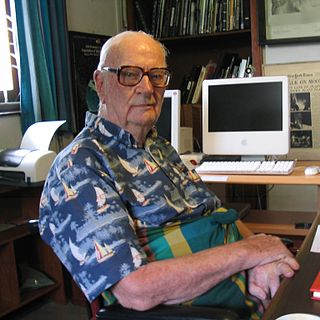
Hard science fiction is a category of science fiction characterized by concern for scientific accuracy and logic. The term was first used in print in 1957 by P. Schuyler Miller in a review of John W. Campbell's Islands of Space in the November issue of Astounding Science Fiction. The complementary term soft science fiction, formed by analogy to hard science fiction, first appeared in the late 1970s. The term is formed by analogy to the popular distinction between the "hard" (natural) and "soft" (social) sciences, although there are examples generally considered as "hard" science fiction such as Isaac Asimov's Foundation series, built on mathematical sociology. Science fiction critic Gary Westfahl argues that neither term is part of a rigorous taxonomy; instead they are approximate ways of characterizing stories that reviewers and commentators have found useful.

Laurence van Cott Niven is an American science fiction writer. His 1970 novel Ringworld won the Hugo, Locus, Ditmar, and Nebula awards. With Jerry Pournelle he wrote The Mote in God's Eye (1974) and Lucifer's Hammer (1977). The Science Fiction and Fantasy Writers of America gave him the 2015 Damon Knight Memorial Grand Master Award.
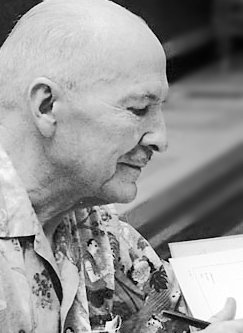
Robert Anson Heinlein was an American science fiction author, aeronautical engineer, and naval officer. Sometimes called the "dean of science fiction writers", he was among the first to emphasize scientific accuracy in his fiction, and was thus a pioneer of the subgenre of hard science fiction. His published works, both fiction and non-fiction, express admiration for competence and emphasize the value of critical thinking. His plots often posed provocative situations which challenged conventional social mores. His work continues to have an influence on the science-fiction genre, and on modern culture more generally.
A future history is a postulated history of the future and is used by authors of science fiction and other speculative fiction to construct a common background for fiction. Sometimes the author publishes a timeline of events in the history, while other times the reader can reconstruct the order of the stories from information provided therein.
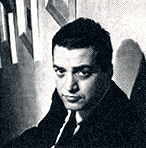
Alfred Bester was an American science fiction author, TV and radio scriptwriter, magazine editor and scripter for comic strips and comic books. He is best remembered for his science fiction, including The Demolished Man, winner of the inaugural Hugo Award in 1953.
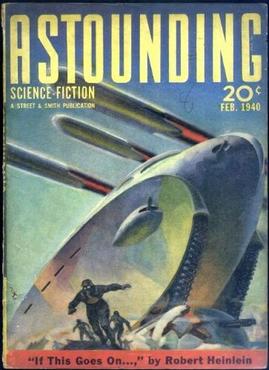
"If This Goes On—" is a science fiction novella by American writer Robert A. Heinlein, first serialized in 1940 in Astounding Science-Fiction and revised and expanded for inclusion in the 1953 collection Revolt in 2100. The novella shows what might happen to Christianity in the United States with mass communications, applied psychology, and a hysterical populace. The novel is part of Heinlein's Future History series.

Revolt in 2100 is a 1953 science fiction collection by American writer Robert A. Heinlein, part of his Future History series.
Reginald Bretnor was an American science fiction author who flourished between the 1950s and 1980s. Most of his fiction was in short story form, and usually featured a whimsical story line or ironic plot twist. He also wrote on military theory and public affairs, and edited some of the earliest books to consider SF from a literary theory and criticism perspective.

Geoffrey Alan Landis is an American aerospace engineer and author, working for the National Aeronautics and Space Administration (NASA) on planetary exploration, interstellar propulsion, solar power and photovoltaics. He holds nine patents, primarily in the field of improvements to solar cells and photovoltaic devices and has given presentations and commentary on the possibilities for interstellar travel and construction of bases on the Moon, Mars, and Venus.

The Future History is a series of stories created by Robert A. Heinlein. It describes a projected future of the human race from the middle of the 20th century through the early 23rd century. The term Future History was coined by John W. Campbell Jr. in the February 1941 issue of Astounding Science Fiction. Campbell published an early draft of Heinlein's chart of the series in the May 1941 issue.
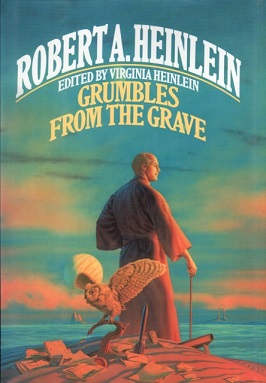
Grumbles from the Grave is a posthumous 1989 autobiography of science fiction author Robert A. Heinlein collated by his wife Virginia Heinlein from his notes and writings.

Rainbow Mars is a 1999 science fiction short story collection by American writer Larry Niven. It contains six stories of Hanville Svetz, five previously published and the longest, "Rainbow Mars", written for the collection. The setting of the Svetz stories is Earth in the distant future. The hereditary leader of the Earth, known as the Secretary General, is an inbred imbecile. In order to maintain the interest of the Secretary, different factions in the capitol use their advanced science to amuse him. Svetz's section uses time travel in an attempt to bring back long extinct animals from Earth's past. Unbeknownst to Svetz and his team, they are actually travelling back into fictional pasts, and returning with mythical creatures.

Inconstant Moon is a science fiction short story collection by American author Larry Niven that was published in 1973. "Inconstant Moon" is also a 1971 short story that is included in the collection. The title refers to "O, swear not by the moon, th' inconstant moon", a quote from the balcony scene in William Shakespeare's Romeo and Juliet. The collection was assembled from the US collections The Shape of Space and All the Myriad Ways.

Requiem: New Collected Works by Robert A. Heinlein and Tributes to the Grand Master is a retrospective on Robert A. Heinlein (1907–1988), after his death, edited by Yoji Kondo.
The science fiction writer Robert A. Heinlein (1907–1988) was productive during a writing career that spanned the last 49 years of his life; the Robert A. Heinlein bibliography includes 32 novels, 59 short stories and 16 collections published during his life. Four films, two TV series, several episodes of a radio series, at least two songs and a board game derive more or less directly from his work. He wrote a screenplay for one of the films. Heinlein edited an anthology of other writers' science fiction short stories.
The Heinlein juveniles are the science-fiction novels written by Robert A. Heinlein for Scribner's young-adult line. Each features "a young male protagonist entering the adult world of conflict, decisions, and responsibilities." Together, they tell a loosely connected story of space exploration. Scribner's published the first 12 between 1947 and 1958, but rejected the 13th, Starship Troopers. That one was instead published by Putnam. A 14th novel, Podkayne of Mars, is sometimes listed as a "Heinlein juvenile", although Heinlein himself did not consider it to be one.
The 20th World Science Fiction Convention (Worldcon), also known unofficially as Chicon III, was held on 31 August–3 September 1962 at the Pick-Congress Hotel in Chicago, Illinois, United States.
"The Hole Man" is a science fiction short story by American writer Larry Niven. It was first published in Analog in January 1974. The story won the Hugo Award for Best Short Story in 1975.

In the Courts of the Crimson Kings is a 2008 alternate history science fiction novel by American writer S. M. Stirling.
This is a complete bibliography by American science fiction author Larry Niven:
References
- ↑ Hugo Nominees 1990, Locus.
- ↑ The Best of Larry Niven, edited by Jonathan Strahan, reviewed by Dan Hartland; published December 13, 2010; retrieved January 17, 2017
- ↑ Science Fiction After 1900: From the Steam Man to the Stars, by Brooks Landon, published May 1, 2014, by Routledge, via Google Books